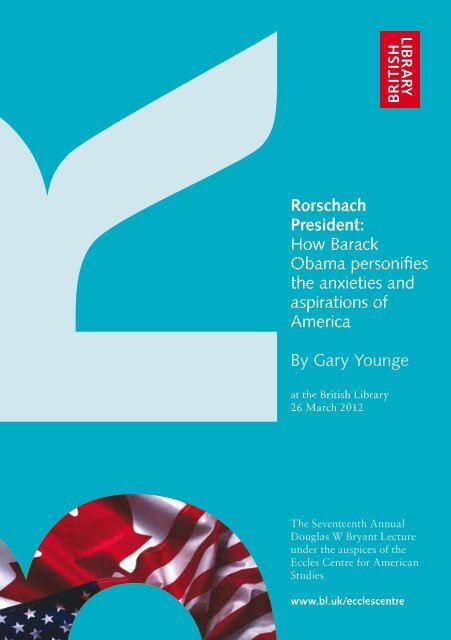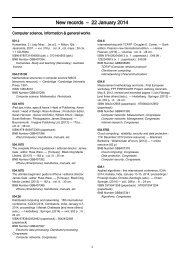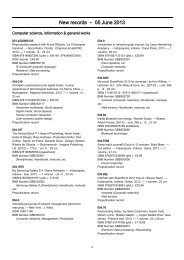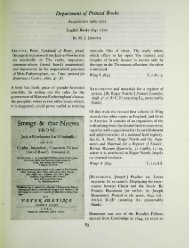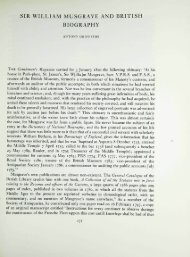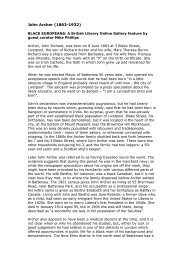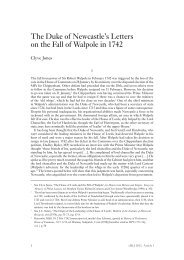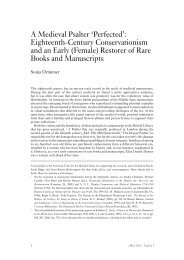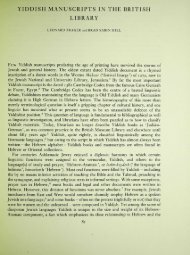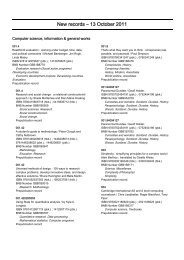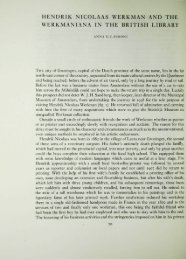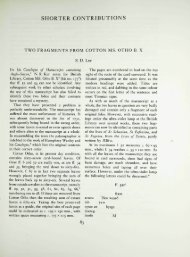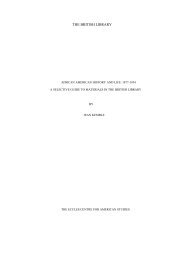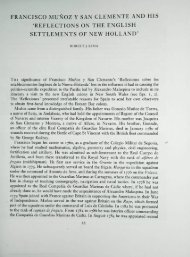Rorschach President: How Barack Obama personifies the anxieties ...
Rorschach President: How Barack Obama personifies the anxieties ...
Rorschach President: How Barack Obama personifies the anxieties ...
Create successful ePaper yourself
Turn your PDF publications into a flip-book with our unique Google optimized e-Paper software.
<strong>Rorschach</strong><br />
<strong>President</strong>:<br />
<strong>How</strong> <strong>Barack</strong><br />
<strong>Obama</strong> <strong>personifies</strong><br />
<strong>the</strong> <strong>anxieties</strong> and<br />
aspirations of<br />
America<br />
By Gary Younge<br />
at <strong>the</strong> British Library<br />
26 March 2012<br />
The Seventeenth Annual<br />
Douglas W Bryant Lecture<br />
under <strong>the</strong> auspices of <strong>the</strong><br />
Eccles Centre for American<br />
Studies<br />
www.bl.uk/ecclescentre
Published by The British Library<br />
The design, setting and camera ready<br />
copy was produced at The British Library<br />
Design Office<br />
ISBN 0 7123 4463 2<br />
Copyright © 2012 The British Library Board
<strong>Rorschach</strong><br />
<strong>President</strong>:<br />
<strong>How</strong> <strong>Barack</strong><br />
<strong>Obama</strong> <strong>personifies</strong><br />
<strong>the</strong> <strong>anxieties</strong> and<br />
aspirations of<br />
America<br />
By Gary Younge<br />
at <strong>the</strong> British Library<br />
26 March 2012<br />
The Seventeenth Annual<br />
Douglas W Bryant Lecture<br />
under <strong>the</strong> auspices of <strong>the</strong><br />
Eccles Centre for American<br />
Studies<br />
www.bl.uk/ecclescentre
GARY YOUNGE is an author, broadcaster and award-winning columnist<br />
for The Guardian, based in Chicago. He also writes a monthly column for<br />
The Nation magazine and is <strong>the</strong> Alfred Knobler Fellow for The Nation<br />
Institute. He has written three books: Who Are We – and Should it<br />
Matter in <strong>the</strong> 21st Century?, Stranger in a Strange Land: Encounters in<br />
<strong>the</strong> Disunited States and No Place Like Home: a Black Briton’s Journey<br />
through <strong>the</strong> American South. He has made several radio and television<br />
documentaries on subjects ranging from <strong>the</strong> Tea Party to hip hop culture.<br />
In 2009 he won <strong>the</strong> James Cameron award for <strong>the</strong> ‘combined moral vision<br />
and professional integrity’ of his coverage of <strong>the</strong> <strong>Obama</strong> campaign.
<strong>Rorschach</strong> <strong>President</strong>: <strong>How</strong> <strong>Barack</strong> <strong>Obama</strong><br />
<strong>personifies</strong> <strong>the</strong> <strong>anxieties</strong> and aspirations<br />
of America<br />
Thank you very much Baroness Blackstone. Thank you Philip Davies,<br />
who has done all <strong>the</strong> work behind <strong>the</strong> scenes to get me here. And thank<br />
you for coming.<br />
I know that <strong>the</strong>se Douglas Bryant lectures have a proud history of <strong>the</strong><br />
spirited exchange of opinions between Europe and America in general,<br />
and Britain and America in particular, and I’m very honoured to be<br />
included in it.<br />
But I come not just in <strong>the</strong> tradition of <strong>the</strong> transatlantic but also <strong>the</strong> Black<br />
Atlantic. That diaspora that has shuttled between Africa, <strong>the</strong> Americas and<br />
Europe ei<strong>the</strong>r through coercion, as my forbears did as slaves, or through<br />
voluntary migration, as my parents did from Barbados. So I have got one<br />
foot in <strong>the</strong> perspective of <strong>the</strong> likes of Alexis De Tocqueville, that great<br />
French observer of American mores; but <strong>the</strong> o<strong>the</strong>r with <strong>the</strong> mindset of <strong>the</strong><br />
likes of CLR James, that great Trinidadian intellectual who wrote<br />
on everything from <strong>the</strong> politics of cricket to <strong>the</strong> Haitian revolution.<br />
So when I arrived in <strong>the</strong> United States with that perspective, it was with<br />
great bemusement that I found myself having to absorb abuse, particularly<br />
from white, right-wing Americans, who badgered me as though <strong>the</strong>ir own<br />
reference points represented <strong>the</strong> sole prism through which global events<br />
could possibly be understood. As though <strong>the</strong> struggle for moral superiority<br />
between Europe and <strong>the</strong> US could have much relevance to someone whose<br />
ancestors were slaves, and whose parents and grandparents lived through <strong>the</strong><br />
war under European colonization. In <strong>the</strong> run-up to <strong>the</strong> Iraq war one white<br />
American said to me: ‘If it wasn’t for us you would be speaking German.’<br />
‘No,’ I told him. ‘If it wasn’t for you, I would probably be speaking Yoruba.’<br />
So it was with that perspective that I witnessed <strong>the</strong> rise of <strong>Barack</strong> <strong>Obama</strong>.<br />
First in <strong>the</strong> Senate race, <strong>the</strong>n in his campaign for <strong>the</strong> presidency, and <strong>the</strong>n
2 <strong>Rorschach</strong> <strong>President</strong>: <strong>How</strong> <strong>Barack</strong> <strong>Obama</strong> <strong>personifies</strong> <strong>the</strong> <strong>anxieties</strong> and aspirations of America<br />
finally <strong>the</strong> presidency itself. And from <strong>the</strong> very earliest moments of his<br />
appearance something struck me not so much about <strong>Obama</strong> himself, but<br />
about <strong>the</strong> way that people related to him. For it seemed as though almost no<br />
sensible conversation relating to <strong>the</strong> man was possible. The cup was never just<br />
half-empty or half-full. It was ei<strong>the</strong>r overflowing with hope and admiration<br />
or had nothing in it at all. It seemed as though some people would prefer to<br />
smash <strong>the</strong> cup, in fact, lest we imbibe <strong>the</strong> poison it almost certainly contained.<br />
I remember on <strong>the</strong> night of Super Tuesday in 2008, at a results watching<br />
party, one woman argued that <strong>the</strong> fact that he was mixed-race inherently<br />
made him more progressive. I offered her a list of mixed race people who<br />
were anything but progressive, but she would not budge. A few years later<br />
I was speaking to a Tea Party supporter in Colorado and I asked him if<br />
he could think of anything, anything at all, that <strong>Barack</strong> <strong>Obama</strong> had done<br />
that he would say was any good. ‘Well, he’s boosted <strong>the</strong> sale of guns and<br />
ammunition,’ he told me with a straight face. ‘My friends are stocking up.’<br />
On <strong>the</strong> left some branded him a sell-out before he even had anything to sell.<br />
On <strong>the</strong> right <strong>the</strong>y insisted he was a Muslim with a fire-breathing pastor,<br />
even though Muslims don’t have pastors. And gradually it dawned on me<br />
that <strong>the</strong>y were not actually talking about <strong>Obama</strong> at all. They were talking<br />
about <strong>the</strong>mselves. ‘The way we see things is affected by what we know<br />
and what we believe,’ wrote John Berger in Ways of Seeing. ‘The relation<br />
between what we see and what we know is never settled.’<br />
The ascent of a black, mixed-race politician born to a white mo<strong>the</strong>r and an<br />
absent Kenyan Muslim fa<strong>the</strong>r at a time of war, economic crisis, demographic<br />
transition and shifting geopolitical power relationships forced a reckoning<br />
between what people saw, what <strong>the</strong>y knew – or thought <strong>the</strong>y knew – and<br />
what <strong>the</strong>y believed. The notion that people would project <strong>the</strong>ir hopes and<br />
fears on to a political leader is nei<strong>the</strong>r unique to America nor <strong>Obama</strong>. But <strong>the</strong><br />
particular confluence of events, identities and his political trajectory, I will<br />
argue over <strong>the</strong> next half an hour, have made <strong>the</strong> discrepancies between who<br />
he is and who people think he is, particularly acute.<br />
Hence <strong>the</strong> title: ‘The <strong>Rorschach</strong> <strong>President</strong>.’ The <strong>Rorschach</strong> test was created<br />
by Swiss psychologist Hermann <strong>Rorschach</strong> in <strong>the</strong> early 20th century. In <strong>the</strong><br />
test, <strong>the</strong> psychologist presents patients with a series of elaborate inkblots<br />
and asks <strong>the</strong>m to talk about what <strong>the</strong> blots mean to <strong>the</strong>m. It’s used to detect
<strong>Rorschach</strong> <strong>President</strong>: <strong>How</strong> <strong>Barack</strong> <strong>Obama</strong> <strong>personifies</strong> <strong>the</strong> <strong>anxieties</strong> and aspirations of America 3<br />
underlying thought disorder as <strong>the</strong> patient filters each blot through <strong>the</strong><br />
prism of <strong>the</strong>ir own preoccupation. The blot is <strong>the</strong> same for everyone. But<br />
everyone sees something different in it.<br />
Now <strong>Obama</strong> has never described himself as an inkblot per se. But he has<br />
always understood this to be, if not a vulnerability, <strong>the</strong>n at <strong>the</strong> very least<br />
a factor. In his second book The Audacity of Hope, he writes: ‘I serve as<br />
a blank screen on which people of vastly different political stripes project<br />
<strong>the</strong>ir own views. As such, I am bound to disappoint some, if not all, of<br />
<strong>the</strong>m.’ Back <strong>the</strong>n – <strong>the</strong> book was written after he’d joined <strong>the</strong> Senate but<br />
before he’d decided to run for president – he put it down to him being a<br />
relative newcomer on <strong>the</strong> political scene. But familiarity, I believe, has<br />
not attenuated <strong>the</strong> problem. If anything it’s accentuated it. And <strong>Obama</strong>, I<br />
will argue, is no mere passive recipient in this process. While he does not<br />
control it, he does at times, try to leverage and game it.<br />
Moreover, <strong>the</strong> nature of <strong>the</strong>se projections, perceptions, presumptions and<br />
assumptions about <strong>Obama</strong> do not emerge from a clear blue sky. They,<br />
like <strong>Obama</strong>, are a function of <strong>the</strong>ir time and place. ‘Men make <strong>the</strong>ir<br />
own history,’ wrote Karl Marx in The Eighteenth Brumaire of Louis<br />
Bonaparte, ‘But <strong>the</strong>y do not make it just as <strong>the</strong>y please; <strong>the</strong>y do not make it<br />
under circumstances chosen by <strong>the</strong>mselves, but under given circumstances<br />
directly encountered and inherited from <strong>the</strong> past.’<br />
The circumstances <strong>Obama</strong> inherited as a president – a massive economic<br />
crisis, deep political polarisation and two failing wars – helped in some ways<br />
to define him to many people. Those who perceived Bush as belligerent,<br />
parochial, indifferent and oafish welcomed <strong>the</strong> arrival of a man who<br />
seemed conciliatory, worldly, curious and refined. He was <strong>the</strong> anti<strong>the</strong>sis of<br />
his predecessor: <strong>the</strong> anti-Bush. Add to that <strong>the</strong> soaring rhetoric, and <strong>the</strong><br />
expectation among much of his base was very high indeed.<br />
So some now look on his record as a disappointment. It is not <strong>the</strong> function<br />
of this lecture to assess that record and to see whe<strong>the</strong>r that is right or not.<br />
But it has always seemed to me that <strong>the</strong> nature of that disappointment is<br />
of an infatuated suitor scorned: ‘I loved you, I followed you, I believed<br />
in you and this is how you repay me: me, personally.’ They saw him as a<br />
transformative radical. But he never said he was a transformative radical.<br />
He never ran as a transformative radical. Now I’m not arguing here ei<strong>the</strong>r
4 <strong>Rorschach</strong> <strong>President</strong>: <strong>How</strong> <strong>Barack</strong> <strong>Obama</strong> <strong>personifies</strong> <strong>the</strong> <strong>anxieties</strong> and aspirations of America<br />
that he should have <strong>the</strong> benefit of <strong>the</strong> doubt. He’s <strong>the</strong> president of <strong>the</strong><br />
wealthiest and most powerful country in <strong>the</strong> world; I think he has enough<br />
benefits as it is. But while <strong>Obama</strong> must take responsibility for <strong>the</strong> many<br />
things he’s done that may have disappointed, his spurned lovers must<br />
take responsibility for <strong>the</strong>ir selective hearing. Just one example would be<br />
his decision to escalate <strong>the</strong> war in Afghanistan. Now I believe that was<br />
wrongheaded. But to qualify as a betrayal, as some have said it was, he<br />
would have had to have promised something else, when <strong>the</strong> truth is that<br />
that is one pledge that he really did keep.<br />
I was in a bar on <strong>the</strong> South Side of Chicago on election night when he<br />
won. And I was with a cameraman and at one stage he panned over to a<br />
woman who was screaming <strong>Obama</strong>’s name – everybody was screaming<br />
<strong>Obama</strong>’s name – and she said, ‘My man is in Afghanistan, and now he’s<br />
coming home.’ And I thought, ‘That’s not true; that’s not true. And you<br />
relating your happiness at <strong>Obama</strong>’s victory with that prospect is a very<br />
good example of <strong>the</strong> Rorshach test. You have been hearing what you want<br />
to hear, and you have been seeing what you want to see.’<br />
After re-reading The God That Failed, <strong>the</strong> book in which six prominent<br />
ex-communists related <strong>the</strong>ir disillusionment with communism, <strong>the</strong> late<br />
Palestinian intellectual Edward Said asked: ‘Why as an intellectual did you<br />
believe in a God anyway? And besides, who gave you <strong>the</strong> right to imagine<br />
that your earlier disbelief and later disenchantment were so important?’<br />
I think when it comes to <strong>Obama</strong>, people have to some extent got to own<br />
<strong>the</strong>ir disappointment because quite often – not for everything, but quite<br />
often – <strong>the</strong>ir disappointment begins and ends with <strong>the</strong>m.<br />
But to get a broader sense of how <strong>Obama</strong> is misunderstood, we have to go<br />
back to <strong>the</strong> circumstances that put his life and ascent in context. <strong>Obama</strong><br />
was born in 1961 – <strong>the</strong> year a group of black and white freedom riders<br />
made international news as <strong>the</strong>y travelled through <strong>the</strong> Deep South to<br />
challenge segregation and were beaten severely for <strong>the</strong>ir efforts. It was four<br />
years before Congress would insist on African Americans’ right to vote<br />
and six years before <strong>the</strong> US Supreme Court formally recognised interracial<br />
marriage as a nationwide civil right.<br />
That same year, 1961, Bobby Kennedy said: ‘There’s no question that in<br />
<strong>the</strong> next thirty or forty years, a Negro can also achieve <strong>the</strong> same position
<strong>Rorschach</strong> <strong>President</strong>: <strong>How</strong> <strong>Barack</strong> <strong>Obama</strong> <strong>personifies</strong> <strong>the</strong> <strong>anxieties</strong> and aspirations of America 5<br />
that my bro<strong>the</strong>r has as <strong>President</strong> of <strong>the</strong> United States.’ A few years later in<br />
his essay, ‘The American Dream and <strong>the</strong> American Negro’, James Baldwin<br />
scoffed at Kennedy’s claims. ‘That sounded like a very emancipated<br />
statement to white people,’ he wrote. ‘They were not in Harlem when this<br />
statement was first heard. They did not hear <strong>the</strong> laughter and bitterness<br />
and scorn with which this statement was greeted. From <strong>the</strong> point of view<br />
of <strong>the</strong> man in <strong>the</strong> Harlem barbershop, Bobby Kennedy only got here<br />
yesterday and now he is already on his way to <strong>the</strong> Presidency. We were here<br />
for 400 years and now he tells us that maybe in 40 years, if you are good,<br />
we may let you become president.’ So in <strong>the</strong> year that <strong>Obama</strong> was born,<br />
commentators were arguing about what his meaning would be.<br />
By <strong>the</strong> time <strong>Obama</strong> goes to secondary school some of <strong>the</strong> biggest names<br />
in civil rights – Martin Lu<strong>the</strong>r King, Malcolm X and Bobby Kennedy –<br />
had been shot. In his twenties he would have seen Jesse Jackson rouse<br />
a rainbow movement and go down to defeat in <strong>the</strong> primaries. In 1988,<br />
<strong>the</strong> year <strong>Obama</strong> starts his law degree and visits Kenya for <strong>the</strong> first time,<br />
Jackson wins <strong>the</strong> state of Michigan and <strong>the</strong>n mounts a serious challenge<br />
in Wisconsin during <strong>the</strong> Democratic primaries. In The New York Times,<br />
columnist E. J. Dionne writes, ‘Let it be recorded that for at least one week<br />
in American history, in a middle-sized, mid-western state, a broad range<br />
of white voters took <strong>the</strong> presidential candidacy of a black man with <strong>the</strong><br />
utmost seriousness.’<br />
By <strong>the</strong> time <strong>Obama</strong> came of age, <strong>the</strong>re was no civil rights movement to<br />
emerge from. But thanks to <strong>the</strong> gains of <strong>the</strong> civil rights era he could attend<br />
<strong>the</strong> nation’s best universities (Columbia and Harvard) and <strong>the</strong>n transition<br />
into politics – not through <strong>the</strong> church, as would previously have been likely<br />
for a black politician, but through academia. He’s not alone. The beginning<br />
of this century saw a new generation of black politicians in America emerge<br />
from <strong>the</strong> Ivy League to positions of power via <strong>the</strong> academy and business.<br />
Among <strong>the</strong>m are <strong>the</strong> Massachusetts governor, Deval Patrick (Harvard); <strong>the</strong><br />
Newark mayor, Cory Booker (Yale); <strong>the</strong> former Tennessee congressman,<br />
Harold Ford Jr (University of Pennsylvania); and <strong>the</strong> Maryland lieutenant<br />
governor, Anthony Brown (Harvard).<br />
So while <strong>Obama</strong>’s rise may have been meteoric, he did not come from<br />
nowhere. The context in which <strong>Obama</strong> emerged intimately, I believe,<br />
informs <strong>the</strong> manner in which he is understood and misunderstood. Now
6 <strong>Rorschach</strong> <strong>President</strong>: <strong>How</strong> <strong>Barack</strong> <strong>Obama</strong> <strong>personifies</strong> <strong>the</strong> <strong>anxieties</strong> and aspirations of America<br />
some of <strong>the</strong>se misunderstandings are comic. Take his name, for example.<br />
When he applied for his community organising job in Chicago <strong>the</strong><br />
interviewers could not make out his ethnicity from his name but assumed<br />
he might be Japanese. Once he was in Chicago and people heard his name<br />
<strong>the</strong>y thought he was likely to be Irish – O’Bama. Later in life his name<br />
would resonate with darker assumptions. During <strong>the</strong> 2008 election some<br />
Republican critics liked to emphasis his middle name – Hussein – carrying<br />
with it <strong>the</strong> implications of both a Muslim identity and some subliminal<br />
connection to Saddam Hussein.<br />
I am very familiar, as a black Briton, with this problem of mistaken identity. I<br />
remember when I was at university, somebody who was on a university court<br />
approaching me and asking me, ‘Mr Younge, where are you from’. And I said<br />
Stevenage. ‘Oh. Well, where were you born?’ And I said, ‘Hitchen’. And so he<br />
said, ‘Well, before <strong>the</strong>n.’ There was no before <strong>the</strong>n.<br />
And so it is with <strong>Obama</strong> that something as simple as how he looks, and<br />
where he is from, becomes complicated. Many of <strong>the</strong>se misunderstandings<br />
are rooted in <strong>the</strong> complexity of race in America. First off, not everyone<br />
sees him as black. One Zogby poll in 2007 showed that after being told his<br />
parents’ race and nationality more than half (55%) of whites and 61% of<br />
Hispanics classified <strong>Obama</strong> as biracial, while two-thirds (66%) of blacks<br />
regarded him as black. They are all hearing <strong>the</strong> same thing, but are seeing<br />
something different. The answer of course is that he’s both. He is black and<br />
bi-racial.<br />
Many refer to him as African American which he both is and is not.<br />
When it comes to ethnicity in America people generally hyphenate one<br />
country with American: Italian-American, Japanese-American, Polish-<br />
American. But <strong>the</strong> term African American came into common usage to<br />
describe a particular experience for <strong>the</strong> descendants of slaves who lived<br />
through segregation, who cannot lay claim to a specific country because<br />
<strong>the</strong>y cannot, with any certainty, pinpoint where <strong>the</strong>ir forbears came from.<br />
In Democracy in America de Tocqueville described <strong>the</strong>ir condition thus:<br />
‘The Negro transmits to his descendants at birth <strong>the</strong> external mark of his<br />
ignominy. The law can abolish servitude, but only God can obliterate its<br />
traces.’ <strong>Obama</strong> bears <strong>the</strong> mark, but he does not have those traces. He is<br />
Kenyan-American, certainly, and Kenya is in Africa. But that does not<br />
make him African American in <strong>the</strong> way that term has become understood.
<strong>Rorschach</strong> <strong>President</strong>: <strong>How</strong> <strong>Barack</strong> <strong>Obama</strong> <strong>personifies</strong> <strong>the</strong> <strong>anxieties</strong> and aspirations of America 7<br />
Now that is nei<strong>the</strong>r better, nor worse; but it is different. As a black male in<br />
America he still faces discrimination. I don’t think Zimmerman’s suspicions<br />
of Trayvon Martin would have been any different if Trayvon’s parents<br />
had been from Jamaica. So it’s not better or worse, it’s just different.<br />
But that difference is not just academic. Unlike o<strong>the</strong>r black immigrants,<br />
African Americans have had nowhere else <strong>the</strong>y can call home and have<br />
seen generations of o<strong>the</strong>r immigrants leapfrog <strong>the</strong>m in social status even<br />
as <strong>the</strong>y were denied <strong>the</strong> most basic rights of American citizenship. A few<br />
years ago <strong>the</strong>re was an intense debate over <strong>the</strong> fact that two-thirds of <strong>the</strong><br />
black students admitted to Harvard – some of whom were beneficiaries<br />
of affirmative action – were <strong>the</strong> descendants of Caribbean or African<br />
immigrants as opposed to African American slaves. Harvard sociology<br />
professor Mary Waters said: ‘You need to have a philosophical discussion<br />
about what are <strong>the</strong> aims of affirmative action. If it’s about getting black<br />
faces at Harvard, <strong>the</strong>n we’re doing fine. If it’s about making up for 200 to<br />
500 years of slavery in this country and its aftermath, <strong>the</strong>n we’re not doing<br />
well. And if it’s about having diversity that includes African Americans<br />
from <strong>the</strong> South or from inner-city high schools, <strong>the</strong>n we’re not doing well<br />
<strong>the</strong>re ei<strong>the</strong>r.’<br />
So while <strong>the</strong> election of a black president was a significant breakthrough,<br />
its relationship to America’s historical racial cleavages is, at <strong>the</strong> very least,<br />
complicated. Commentator Stanley Crouch wrote in 2007: ‘If we end up<br />
with him as our first black president, he will have come into <strong>the</strong> White<br />
House through a side door – which might at this point be <strong>the</strong> only door<br />
open.’<br />
This can work both ways for <strong>Obama</strong>. Unlike African Americans he can<br />
appeal to America’s immigrant sensibilities. In his speech to <strong>the</strong> Democratic<br />
Party convention in 2004, that propelled him to <strong>the</strong> national stage, he<br />
evoked <strong>the</strong> immigrant dream of how his fa<strong>the</strong>r came from Kenya to<br />
America and he called it ‘a magical place’. Now it is difficult to imagine <strong>the</strong><br />
fa<strong>the</strong>r of most African Americans describing <strong>the</strong> US as a magical place in<br />
1959 – a period when civil rights protesters filled Sou<strong>the</strong>rn jails if <strong>the</strong>y were<br />
lucky and were murdered if <strong>the</strong>y were not.<br />
On <strong>the</strong> o<strong>the</strong>r hand, no-one has ever asked Jesse Jackson to produce his<br />
birth certificate. <strong>Obama</strong>’s Kenyan heritage was enough to prompt <strong>the</strong><br />
suspicion among many – at times more than a third of <strong>the</strong> country and
8 <strong>Rorschach</strong> <strong>President</strong>: <strong>How</strong> <strong>Barack</strong> <strong>Obama</strong> <strong>personifies</strong> <strong>the</strong> <strong>anxieties</strong> and aspirations of America<br />
a half of all Republicans – that he was not born in America and <strong>the</strong>refore<br />
not <strong>the</strong> legitimate <strong>President</strong> of <strong>the</strong> country. The accusation levelled against<br />
many a black leader has long been that <strong>the</strong>y were un-American. The charge<br />
against <strong>Obama</strong> was that he was not even American.<br />
But that did not stop some, both conservatives and liberals, from locating<br />
<strong>Obama</strong> directly within <strong>the</strong> lineage of African American history. ‘<strong>Obama</strong><br />
is what comes at <strong>the</strong> end of <strong>the</strong> bridge in Selma,’ said Congressman John<br />
Lewis, who was a civil rights activist in <strong>the</strong> sixties. Well, yes, in so far as<br />
in Selma <strong>the</strong>y were fighting for racial equality. And no, in so far as <strong>Obama</strong><br />
did not inherit those inequalities that are passed on from generation to<br />
generation. ‘<strong>Obama</strong> embodies and preaches <strong>the</strong> true and vital message<br />
that in today’s America,’ wrote Stuart Taylor Jr. in National Journal. ‘The<br />
opportunities available to black people are unlimited if <strong>the</strong>y work hard,<br />
play by <strong>the</strong> rules, and get a good education.’ Well, no. <strong>Obama</strong>’s ascent does<br />
not address <strong>the</strong> historical roots of racial discrimination in America since<br />
that is not where his personal history lies. It does not mean <strong>the</strong>re is not a<br />
relationship between those two. But he is not <strong>the</strong> example that you would<br />
use in order to make that case.<br />
This difference was occasionally noted, but not necessarily understood.<br />
In an edition of ‘Hardball’, an influential political cable television show,<br />
<strong>the</strong> host Chris Mat<strong>the</strong>ws tried to get to <strong>the</strong> heart of <strong>Obama</strong>’s appeal, at<br />
least to him. ‘I don’t think you can find a better starting gate personality<br />
than <strong>Obama</strong> as a black candidate,’ he said. ‘I can’t think of a better one.<br />
No history of Jim Crow, no history of anger, no history of slavery. All <strong>the</strong><br />
bad stuff in our history just ain’t <strong>the</strong>re with this guy.’ This, of course, is<br />
nonsense. <strong>Obama</strong>’s mo<strong>the</strong>r is a white woman from Kansas. Of course he<br />
has a history of Jim Crow and slavery in his family. Black people didn’t<br />
enslave and segregate <strong>the</strong>mselves. And <strong>Obama</strong> has said that he actually has<br />
ancestors who did in all likelihood own slaves.<br />
But <strong>the</strong> point – as far as this lecture is concerned – is that when Mat<strong>the</strong>ws<br />
looked at him, that’s what he saw. And this has worked in a number of<br />
ways. On <strong>the</strong> one hand you have <strong>the</strong> people – and <strong>the</strong>y emerged with force<br />
after 2009 – who really do fear or venerate his blackness. But on o<strong>the</strong>r<br />
hand you have those who, because of his complicated relationship to <strong>the</strong><br />
African American story, question his au<strong>the</strong>nticity. In an interview with<br />
CBS’s Steve Kroft in 2007, <strong>the</strong> line of questioning went as follows.
<strong>Rorschach</strong> <strong>President</strong>: <strong>How</strong> <strong>Barack</strong> <strong>Obama</strong> <strong>personifies</strong> <strong>the</strong> <strong>anxieties</strong> and aspirations of America 9<br />
Kroft: Your mo<strong>the</strong>r was white. Your fa<strong>the</strong>r was African?<br />
<strong>Obama</strong>: Right.<br />
Kroft: You spent most of your life in a white household?<br />
<strong>Obama</strong>: Yeah.<br />
Kroft: So you grew up white.<br />
<strong>Obama</strong>: I’m not sure that would be true. I think what would be true is to<br />
say that I didn’t have <strong>the</strong> typical background of African-Americans . . .<br />
Kroft: But you were raised in a white household?<br />
<strong>Obama</strong>: Right.<br />
Kroft: Yet at some point, you decided that you were black?<br />
Then <strong>the</strong>re’s African American professor, Cornel West, who last year<br />
argued: ‘I think my dear bro<strong>the</strong>r <strong>Barack</strong> <strong>Obama</strong> has a certain fear of free<br />
black men. It’s understandable. As a young bro<strong>the</strong>r who grows up in a<br />
white context, brilliant African fa<strong>the</strong>r, he’s always had to fear being a white<br />
man with black skin. All he has known culturally is white … When he<br />
meets an independent black bro<strong>the</strong>r, it is frightening to him.’<br />
<strong>Obama</strong>’s inability to fit neatly into any single racial designation is<br />
discomforting for some but provides solace to many o<strong>the</strong>rs in a country<br />
where traditional racial categories are coming under significant strain.<br />
Recently, a Pew research report revealed that more than one in seven new<br />
marriages in <strong>the</strong> US is between people of a different race or ethnicity.<br />
The research revealed that mixed-marriages now comprise 8.4% of all<br />
marriages in <strong>the</strong> US in 2010, more than double <strong>the</strong> proportion of 1980. The<br />
2010 census showed an increase of around 50% of respondents marking<br />
more than one race on <strong>the</strong>ir census forms in <strong>the</strong> first ten years that such an<br />
option was available. But not only is <strong>the</strong>re more mixing, <strong>the</strong> mix itself is<br />
under a dramatic transformation. Half <strong>the</strong> children born <strong>the</strong> year <strong>Obama</strong><br />
was elected were non-white. In four states – New Mexico, Hawaii, Texas<br />
and California – non-Hispanic whites are already a minority. In a fur<strong>the</strong>r
10 <strong>Rorschach</strong> <strong>President</strong>: <strong>How</strong> <strong>Barack</strong> <strong>Obama</strong> <strong>personifies</strong> <strong>the</strong> <strong>anxieties</strong> and aspirations of America<br />
six – Nevada, Arizona, Mississippi, Georgia, Maryland and Florida – white<br />
children under <strong>the</strong> age of eighteen are a minority. At current rates, by 2042<br />
whites will be a minority in <strong>the</strong> country as a whole.<br />
So for some, <strong>Obama</strong> embodies <strong>the</strong> aspiration to an almost utopian future<br />
in which race no longer matters. Indeed, when he won his primary in South<br />
Carolina, a state where blacks are almost three times as likely to live in<br />
poverty and five times more likely to go to prison than whites, that was<br />
precisely what <strong>the</strong> crowd chanted – ‘Race doesn’t matter’ – over and over<br />
again. Ultimately, for all of us, unfortunately, racism still does matter.<br />
But <strong>Obama</strong>’s shape-shifting identity is also <strong>the</strong> source of great anxiety<br />
for those, particularly on <strong>the</strong> right, who have yet to find an organising<br />
model or political trajectory that can move beyond <strong>the</strong> old categories and<br />
galvanise <strong>the</strong> new. They mourn <strong>the</strong> certainties of <strong>the</strong> past and are insecure<br />
about what this new future might look like and quite where <strong>the</strong>ir place in it<br />
will be. When activists from <strong>the</strong> Tea Party, which is overwhelmingly white,<br />
insist, ‘We want our country back’ this is partly, I believe, what <strong>the</strong>y are<br />
referring to, albeit usually implicitly, and maybe even unconsciously. But<br />
<strong>the</strong>ir <strong>anxieties</strong> go way beyond race. I have spoken a lot about race. But I<br />
believe that in all of this, race is really a signifier for a far more deep-seated<br />
insecurity playing out at a national and international level.<br />
For example, <strong>the</strong> US may have been one of <strong>the</strong> principal motors of neoliberal<br />
globalization, but its citizens often see <strong>the</strong>mselves as its victims.<br />
From 47 countries polled by Pew in 2007, Americans showed <strong>the</strong> sharpest<br />
decline in <strong>the</strong>ir support for foreign trade and had <strong>the</strong> least positive view of<br />
it. By roughly 2030 China’s GDP will overtake America. You see this on<br />
<strong>the</strong> campaign trail all <strong>the</strong> time. Newt Gingrich has a line where he says, ‘I<br />
look forward to <strong>the</strong> day when a US <strong>President</strong> will no longer have to bow to<br />
a Saudi prince.’ And <strong>the</strong>re is a range of metaphors in <strong>the</strong>re. But <strong>the</strong> idea is<br />
that we are not <strong>the</strong> country that we used to be. They call it declinism. And<br />
it has taken a very feverish hold on <strong>the</strong> Republican psyche at <strong>the</strong> moment.<br />
To <strong>the</strong> sting of economic vulnerability has been added <strong>the</strong> indignity of<br />
geopolitical decline and <strong>the</strong> erosion of <strong>the</strong> myth of invincibility that lay at<br />
<strong>the</strong> heart of America’s post-war national self-image. Shortly after <strong>Obama</strong>’s<br />
election, <strong>the</strong> National Intelligence Council, which coordinates analysis<br />
from all US intelligence agencies and assesses America’s role in <strong>the</strong> world,
<strong>Rorschach</strong> <strong>President</strong>: <strong>How</strong> <strong>Barack</strong> <strong>Obama</strong> <strong>personifies</strong> <strong>the</strong> <strong>anxieties</strong> and aspirations of America 11<br />
concluded: ‘Owing to <strong>the</strong> relative decline of its economic and, to a lesser<br />
extent, military power, <strong>the</strong> US will no longer have <strong>the</strong> same flexibility in<br />
choosing among as many policy options.’ The report acknowledged that<br />
while <strong>the</strong> US would remain <strong>the</strong> single most powerful force in <strong>the</strong> world,<br />
its relative strength and potential leverage are waning.<br />
This trajectory was in no small part aggravated by failed wars against<br />
predominantly Muslim countries that followed terrorist attacks by Islamic<br />
fundamentalists. A national furore was sparked by plans to build an<br />
Islamic community centre in Lower Manhattan. There were protests<br />
against <strong>the</strong> ‘9/11’ mosque which was not a mosque and several blocks from<br />
<strong>the</strong> scene of <strong>the</strong> 9/11 terror attacks on <strong>the</strong> world trade center. At <strong>the</strong> height<br />
of <strong>the</strong> controversy one in three Americans said a Muslim should not be<br />
allowed to stand for president and more than one in four believed Muslims<br />
should not be eligible to sit on <strong>the</strong> Supreme Court. In a referendum in 2010<br />
more than 70% of Oklahomans voted to ban <strong>the</strong> introduction of Sharia<br />
Law in a state where Muslims comprise less than 0.2% of <strong>the</strong> population.<br />
And it is in this political, economic and demographic period that <strong>the</strong><br />
country elected a black president, with an African name and a foreign<br />
fa<strong>the</strong>r who was a non-practising Muslim. <strong>Obama</strong> – to many – does not<br />
only personify a world <strong>the</strong>y don’t know but one <strong>the</strong>y don’t like, and maybe<br />
even one <strong>the</strong>y fear.<br />
Now lest anyone believe I’m making a partisan point here <strong>the</strong> first attempt<br />
to parlay <strong>the</strong>se features of vulnerability for political gain came from within<br />
Hillary Clinton’s campaign. In an internal memo her chief strategist,<br />
Mark Penn, argued: ‘All of <strong>the</strong>se articles about his boyhood in Indonesia<br />
and his life in Hawaii are geared towards showing his background as<br />
diverse, multicultural and putting that in a new light. Save it for 2050,’ he<br />
says. ‘It also exposes a very strong weakness for him, because his roots to<br />
basic American values and culture are at best limited. I cannot imagine<br />
America electing a president during a time of war who is not at his center<br />
fundamentally American in his thinking and in his values. <strong>How</strong> we would<br />
give some life to this contrast without turning negative?’ Penn asks Clinton<br />
rhetorically. ‘Every speech that Hillary makes should contain <strong>the</strong> line you<br />
were born in <strong>the</strong> middle of <strong>the</strong> country, to <strong>the</strong> middle class in <strong>the</strong> middle<br />
of <strong>the</strong> last century...Let’s explicitly own ‘American’ in our programs, <strong>the</strong><br />
speeches and <strong>the</strong> values because he doesn’t. Make this a new American
12 <strong>Rorschach</strong> <strong>President</strong>: <strong>How</strong> <strong>Barack</strong> <strong>Obama</strong> <strong>personifies</strong> <strong>the</strong> <strong>anxieties</strong> and aspirations of America<br />
Century, <strong>the</strong> American Strategic Energy Fund. Let’s use our logo to make<br />
some flags that we can give out. Let’s add flag symbols to <strong>the</strong> backgrounds.’<br />
But what Penn didn’t figure out is that it was precisely this cosmopolitan<br />
element that appealed to some people – particularly <strong>the</strong> young and <strong>the</strong><br />
educated. ‘With his multi-ethnic family and his globe-spanning childhood,<br />
<strong>the</strong>re is a little piece of everything in <strong>Obama</strong>,’ gushed The New York<br />
Times conservative columnist David Brooks. Among <strong>the</strong> young, pollster<br />
John Zogby has labelled those in <strong>the</strong> 18-29 age group <strong>the</strong> First Globals:<br />
‘[They are <strong>the</strong> first generation] to bring a consistently global perspective<br />
to everything from foreign policy to environmental issues to <strong>the</strong> coffee<br />
<strong>the</strong>y buy, <strong>the</strong> music <strong>the</strong>y listen to and <strong>the</strong> clo<strong>the</strong>s <strong>the</strong>y wear,’ he claims. A<br />
quarter of <strong>the</strong>m think <strong>the</strong>y’ll end up living for some significant period in a<br />
country o<strong>the</strong>r than America. Having lived <strong>the</strong>ir entire adult life with <strong>the</strong>ir<br />
nation at war <strong>the</strong>y are more likely to believe in multilateral global solutions<br />
and to be more resistant to unilateral military intervention. In his book The<br />
Way We’ll Be, Zogby says, ‘I like to tell audiences that while First Globals<br />
might not be more able than o<strong>the</strong>r cohorts to point to Darfur on a map,<br />
<strong>the</strong>y at least know <strong>the</strong>re is a Darfur and <strong>the</strong>y care what’s happening <strong>the</strong>re.’<br />
Since <strong>Obama</strong>’s arrival on <strong>the</strong> national political scene <strong>the</strong> challenge has been<br />
to try and separate <strong>the</strong> symbolic nature of his candidacy and presidency<br />
from <strong>the</strong> substantial consequences of both. It is <strong>the</strong> tension between <strong>the</strong>se<br />
two elements that makes conversations about him so fraught. For while<br />
symbols should not be mistaken for substance that does not mean <strong>the</strong>y<br />
are insubstantial, and in <strong>the</strong> words of George Carlin, you shouldn’t leave<br />
symbols to <strong>the</strong> symbol-minded. Black, biracial, African American, African,<br />
Muslim, immigrant, cosmopolitan, radical, moderate, socialist even – if<br />
you’re trying to discover what ails, scares, inspires, divides and comforts<br />
America you could do worse than go to a mall, hold up a picture of <strong>Obama</strong><br />
to a range of Americans and ask <strong>the</strong>m what <strong>the</strong>y see.<br />
In many ways I think he is America’s future come just that bit too early.<br />
Some look at it, embrace it, and believe it couldn’t have come too soon.<br />
O<strong>the</strong>rs could no more look at it than <strong>the</strong>y could look at <strong>the</strong> sun, and fear<br />
for what this new world will mean for <strong>the</strong>m. They are all looking at <strong>the</strong><br />
same thing, but are all understanding that thing differently.
<strong>Rorschach</strong> <strong>President</strong>: <strong>How</strong> <strong>Barack</strong> <strong>Obama</strong> <strong>personifies</strong> <strong>the</strong> <strong>anxieties</strong> and aspirations of America 13<br />
In <strong>the</strong> words of <strong>the</strong> late Kurt Vonnegut: ‘We are <strong>the</strong> sum of <strong>the</strong> things that<br />
we pretend to be. So we must be careful what we pretend to be.’<br />
Thank you.
14 <strong>Rorschach</strong> <strong>President</strong>: <strong>How</strong> <strong>Barack</strong> <strong>Obama</strong> <strong>personifies</strong> <strong>the</strong> <strong>anxieties</strong> and aspirations of America<br />
Questions and Answers<br />
Question: My question really relates to class. There is an impression – and<br />
I’d love you to disavow me of it – that <strong>the</strong>re is a class of black Americans<br />
– well-educated, well-off – who are not particularly interested in helping<br />
<strong>the</strong>ir bro<strong>the</strong>rs up. And I am wondering where <strong>Obama</strong> sits in that dialogue?<br />
If you feel he ignores it? Or, does he try to encourage those that are not<br />
trying to help <strong>the</strong>ir bro<strong>the</strong>rs up, to help <strong>the</strong>m?<br />
Answer: That’s a good question. First of all, one interesting fact about<br />
<strong>Obama</strong>’s presidency is that one of <strong>the</strong> groups – in fact, I think <strong>the</strong> group –<br />
that has done worse under <strong>Obama</strong> is African Americans. The wealth gap<br />
between black and white has actually grown under his presidency. And<br />
this is where conversations about <strong>Obama</strong> get fraught; because what I am<br />
not saying necessarily is that those two things are causal. They may well<br />
be coincidental. But it is none<strong>the</strong>less true. And yet, African Americans are<br />
by far his most loyal base and, paradoxically, feel as though <strong>the</strong>y are doing<br />
better, even though <strong>the</strong>y are not. And I think that is ano<strong>the</strong>r <strong>Rorschach</strong><br />
example. They look at <strong>Obama</strong> and see that this thing is possible. Even if it<br />
is not possible for <strong>the</strong>m, <strong>the</strong>y understand it is possible in <strong>the</strong> outside world.<br />
I think that what happens after <strong>the</strong> civil rights movement is that you get<br />
African Americans having <strong>the</strong> right and <strong>the</strong> opportunity to be as selfish<br />
as everybody else. If we turned that question around and asked how are<br />
wealthy, white Americans helping poor, white, Americans we’d be, ‘Steady<br />
on!’ We are already in socialist territory <strong>the</strong>re, which is incredibly dangerous!<br />
So to <strong>the</strong> extent that <strong>the</strong>y still vote Democrat, arguably <strong>the</strong>y still identify<br />
with <strong>the</strong> same party. But yes, <strong>the</strong> civil rights movement meant that you no<br />
longer had to all live in <strong>the</strong> same area. Some people could get better jobs.<br />
And some people could <strong>the</strong>n move out. I don’t know <strong>the</strong> stats on things like<br />
volunteering and so on, but my guess would be that African Americans and<br />
evangelical Christians – who made <strong>the</strong> base of 2000 – would be doing <strong>the</strong><br />
most charitable work. That is just a guess. If you are African American, in<br />
all likelihood you are no more than two generations away from <strong>the</strong> South<br />
and from poverty. In all likelihood not all of your family has come with<br />
you, so you have some relationship to poverty. In terms of <strong>Obama</strong>’s record,<br />
he certainly hasn’t done any worse than any o<strong>the</strong>r Democratic president.<br />
I would not say that he has done an awful lot better ei<strong>the</strong>r. It is a good<br />
example of him being actually a very middle of <strong>the</strong> road Democrat.
<strong>Rorschach</strong> <strong>President</strong>: <strong>How</strong> <strong>Barack</strong> <strong>Obama</strong> <strong>personifies</strong> <strong>the</strong> <strong>anxieties</strong> and aspirations of America 15<br />
Question: The point you seem to be making is that people misinterpreted<br />
<strong>Obama</strong>, by trying to read things into what he said. But <strong>the</strong> o<strong>the</strong>r side<br />
of that, of course, is that <strong>the</strong> things that he said did not animate people<br />
enough to be interested in those issues. That he did not promote himself<br />
strongly enough – for example, on <strong>the</strong> issue of race – to try and resolve any<br />
of <strong>the</strong>se problems. So isn’t <strong>the</strong>re a case to take a step back and say, ‘Well,<br />
why is it that <strong>the</strong> personal is political at this scale?’ That people can’t relate<br />
to politics in a way that relates to <strong>the</strong> issues. Instead <strong>the</strong>y try to relate to<br />
<strong>the</strong> person. And, self-consciously, <strong>the</strong> <strong>Obama</strong> campaign were very clear on<br />
this issue of pushing <strong>the</strong> story of <strong>the</strong> <strong>President</strong> to make his personality come<br />
across. So when Palin came along, <strong>the</strong>y said, ‘Well, she might be difficult<br />
because she has this story.’ And on Romney <strong>the</strong>y are saying he’s not a<br />
problem now because he can’t really talk about himself. And so <strong>the</strong>re is a<br />
much bigger thing than what people read into it. And that is: what politics<br />
seems to have become reduced to.<br />
Answer: Yes. I mean to some extent in America, and I would say to a lesser<br />
extent here, politics at that level is a performance. It’s which candidate<br />
would you prefer to have a beer with? Which candidate comes across in<br />
a certain way? And it’s a rare candidate – George W Bush being one of<br />
<strong>the</strong>m – who doesn’t stand on <strong>the</strong>ir story. Clinton was <strong>the</strong> boy from Hope.<br />
The trouble with George W Bush – and I’m not being snide here – is that<br />
he didn’t have much of a story until he was in his mid-40s, and <strong>the</strong>n to<br />
some extent <strong>the</strong>re was his finding God. With Reagan <strong>the</strong>re was a cowboy<br />
element. Jimmy Carter was <strong>the</strong> peanut farmer. So in all sorts of ways,<br />
millions of dollars are spent on framing and marketing <strong>the</strong>se people to sell<br />
<strong>the</strong>m like cereal. Think back to Al Gore’s earth-toned shirts and so on.<br />
So, we can have a conversation about whe<strong>the</strong>r performance should matter.<br />
But I don’t think <strong>the</strong>re is much of a conversation about whe<strong>the</strong>r it does<br />
matter. Certainly how <strong>the</strong>y are perceived and how <strong>the</strong>y come across<br />
does matter. And that has been a problem for Romney for this last little<br />
while. The issue is whe<strong>the</strong>r those conversations can be made substantial.<br />
Sometimes <strong>the</strong>y can. For example, conversations about Mitt Romney’s<br />
wealth can prompt an interesting debate about venture capitalism as<br />
opposed to manufacturing, or something else. They don’t always, but <strong>the</strong>y<br />
might. There is a lecture that could be given about <strong>Obama</strong>’s record. But<br />
actually one of <strong>the</strong> things I find interesting about <strong>Obama</strong> is not actually<br />
his record; that could be done quite quickly, and it is quite chequered. For
16 <strong>Rorschach</strong> <strong>President</strong>: <strong>How</strong> <strong>Barack</strong> <strong>Obama</strong> <strong>personifies</strong> <strong>the</strong> <strong>anxieties</strong> and aspirations of America<br />
me it is about how <strong>Obama</strong> serves as about a million and one metaphors<br />
for how <strong>the</strong> country is changing: what its fears and what its hopes are.<br />
And so for me he is an interesting way of talking about <strong>the</strong> country. He<br />
is an interesting and useful way to discuss what is going on in America.<br />
But actually as <strong>President</strong>? Then you are looking at what he has and hasn’t<br />
done. I think you could make up your mind about that. I don’t know that it<br />
would be particularly revelatory. If it would be, those revelations wouldn’t<br />
come from me.<br />
Question: If 2008 was about extreme hope – and for o<strong>the</strong>rs just relief that<br />
<strong>the</strong> Bush years were coming to an end – and 2010 was about anger and<br />
disappointment, what do you think is going to motivate <strong>the</strong> 2012 election<br />
from now until November?<br />
Answer: Money. This will be <strong>the</strong> most expensive campaign in <strong>the</strong> history of<br />
<strong>the</strong> country by a long, long way.<br />
It is difficult because <strong>the</strong> Republican race is still dragging on interminably.<br />
But it is going to be about <strong>the</strong> economy. Unless <strong>the</strong> Republicans choose to<br />
make it about something else – like contraception, or gay marriage, which<br />
can be winning issues by <strong>the</strong> way – <strong>the</strong>n it will be about <strong>the</strong> economy. That<br />
is certainly what <strong>the</strong> Republicans wanted it to be about.<br />
And it will be about government: how much, and what can it do.<br />
Both of <strong>the</strong>se are extensions of 2010. But now we are in a situation where<br />
<strong>the</strong> trajectory has changed. The economy is nudging up. I think – I think –<br />
that <strong>the</strong> <strong>Obama</strong> campaign might pitch <strong>the</strong>ir tent as <strong>the</strong> hopeful party; <strong>the</strong><br />
party of <strong>the</strong> future; things are looking better; stick with us; we’re on our<br />
way. They’ve tried that, <strong>the</strong>y’ve actually road-tested that and it didn’t do<br />
very well. And <strong>the</strong>y would try and portray <strong>the</strong> Republicans as <strong>the</strong> party of<br />
<strong>the</strong> past; <strong>the</strong> party that keeps looking backwards and saying things were<br />
better way back when. And Mitt Romney sometimes sounds like he wants<br />
to go back to <strong>the</strong> fifties. Rick Santorum sometimes sounds like he wants<br />
to go back to <strong>the</strong> eighteenth century. So, I think one of <strong>the</strong> polls to watch<br />
will be if people think things are getting better or if America is on <strong>the</strong><br />
right track or not. I think that will be a far better indicator to trust than<br />
<strong>Obama</strong>’s opinion rating.
<strong>Rorschach</strong> <strong>President</strong>: <strong>How</strong> <strong>Barack</strong> <strong>Obama</strong> <strong>personifies</strong> <strong>the</strong> <strong>anxieties</strong> and aspirations of America 17<br />
Question: You mentioned if <strong>the</strong> Republicans should take up ano<strong>the</strong>r<br />
issue. Well, I would say one of <strong>the</strong> o<strong>the</strong>r issues lingering somewhere in <strong>the</strong><br />
background is Iran. There is a general belief in <strong>the</strong> intelligence community<br />
in <strong>the</strong> United States and in Israel that <strong>the</strong> Iranians are not developing a<br />
nuclear programme. There seems to be a political impetus in parts of<br />
Europe and in <strong>the</strong> United States towards a war agenda. Do you think that<br />
this is likely to have a profound impact ei<strong>the</strong>r before or after <strong>the</strong> election?<br />
If it happens before <strong>the</strong> election it is certainly <strong>the</strong> death knell for <strong>Obama</strong>.<br />
If it happens after <strong>the</strong> election it is certainly going to be a disaster for <strong>the</strong><br />
American economy.<br />
Answer: I don’t know that it will be a big issue before <strong>the</strong> election.<br />
Obviously, I can’t predict whe<strong>the</strong>r someone is actually going to bomb<br />
Iran or not. But I wouldn’t be so certain that if a war does start that that<br />
is <strong>the</strong> death knell for <strong>Obama</strong>. In times of war, Americans tend to stick<br />
with <strong>the</strong>ir presidents ra<strong>the</strong>r that dump <strong>the</strong>m. I think <strong>the</strong> way in which it<br />
is important is <strong>the</strong> way in which it is framed. The Republican line is that<br />
<strong>Obama</strong> runs around <strong>the</strong> world apologising for America: he is weak. And so<br />
<strong>the</strong> Iranian question is framed for <strong>the</strong> Democrats as, ‘I’m a steady hand on<br />
<strong>the</strong> tiller. I’m watching this. I’ve got this covered. And remember, I killed<br />
Bin Laden.’ For <strong>the</strong> Republicans it is, ‘Here’s ano<strong>the</strong>r bit of <strong>the</strong> world that<br />
is spinning out of control. And this man is not a leader. And what America<br />
needs is leadership. Someone who will go out and bat for America and not<br />
apologise for it.’ So to <strong>the</strong> extent that that issue continues – and we know it<br />
is not going away – it’s about consistency for <strong>the</strong> Democrats, and weakness<br />
for <strong>the</strong> Republicans.<br />
Question: Thank you for that. And thank you for your reporting. Can you<br />
say a bit more about how you feel as a black Briton reporting on <strong>the</strong> States<br />
back here, with <strong>the</strong> special relationship. <strong>How</strong> have you felt that you have<br />
been part of that?<br />
Answer: Well, it gives you ins, in certain places or in certain ways. There<br />
are things that I can cover, where I am unobtrusive, which is how I like to<br />
do my reporting – with my notebook in my back-pocket kind of thing. I<br />
think <strong>the</strong> easiest way is just to tell you how I do it in general, because it is<br />
fairly comic and it also works. So, what I usually do is walk up to people<br />
and say, ‘Hello, I’m English.’ Because first of all it kind of completely<br />
interrupts whatever it is that <strong>the</strong>y think <strong>the</strong>y are doing. Secondly, if I go
18 <strong>Rorschach</strong> <strong>President</strong>: <strong>How</strong> <strong>Barack</strong> <strong>Obama</strong> <strong>personifies</strong> <strong>the</strong> <strong>anxieties</strong> and aspirations of America<br />
up to people and say, ‘Can I ask you a question?’ <strong>the</strong>y usually think I am<br />
going to ask <strong>the</strong>m for money. So, I say I am from England. And we usually<br />
have a little chat about England; and about <strong>the</strong> Queen, sometimes. And<br />
<strong>the</strong>n from <strong>the</strong>re we can go on to politics and policies. I would say <strong>the</strong>re are<br />
some issues that I cover for which I have a sensitivity – or have an interest<br />
in, maybe – that white journalists might not. In <strong>the</strong> same way that Latino<br />
journalists would have certain interests. But at <strong>the</strong> end of <strong>the</strong> day, you’ve<br />
still got to file. You’ve got to send <strong>the</strong> stories that <strong>the</strong>y want. But that is<br />
my MO: a slightly toffier accent than I actually have and front-casing<br />
my Englishness, which generally I find Americans find quite disarming.<br />
Unlike <strong>the</strong> rest of Europe, who think we are hooligans, Americans don’t<br />
understand that yet.<br />
Question: I’m just wondering what personal interactions you’ve had with<br />
<strong>Obama</strong>? And also how much attention <strong>the</strong> Administration pays to voices<br />
like The Guardian, in your experience.<br />
Answer: So, I’ve had no interactions with <strong>Obama</strong>, which is – it’s not<br />
deliberate in so much that he’s been calling me and I haven’t been calling<br />
him back! But it’s deliberate in so far as I made a decision quite early on<br />
that <strong>the</strong>re was very little point in even trying to get an interview because I<br />
find <strong>the</strong> closer you get to politicians, <strong>the</strong> less you see. And so I didn’t want<br />
to go on his plane, which was an option at one stage with The Guardian. I<br />
could see <strong>the</strong> value in terms of telling my grandchildren. But actually as a<br />
piece of reporting, I generally find those reports very, very dull. You’re told<br />
where to go. You’re told what you can see. And <strong>the</strong>n you produce what you<br />
see, which is actually what you could see on TV. I had to do it once in 2005<br />
with Blair, and I was just bored, quite honestly: Blair and William Hague. I<br />
thought it was dull.<br />
So even on election night – and this is also part of my MO – I was with a<br />
videographer and I said look, let’s not go to Grand Park (which is where<br />
<strong>the</strong> big celebrations were), everybody else is going to be <strong>the</strong>re. Let’s find<br />
somewhere on <strong>the</strong> South Side of Chicago where <strong>the</strong>y are watching it and<br />
watch it with people and get that. To me, I am <strong>the</strong>n contributing something<br />
to <strong>the</strong> news cycle, as opposed to just being part of it.<br />
I also have only been to one convention – and this is my fifth election –<br />
for <strong>the</strong> very reason that conventions are organised for <strong>the</strong> media. So why
<strong>Rorschach</strong> <strong>President</strong>: <strong>How</strong> <strong>Barack</strong> <strong>Obama</strong> <strong>personifies</strong> <strong>the</strong> <strong>anxieties</strong> and aspirations of America 19<br />
would I go? So, I haven’t had any interactions with <strong>Obama</strong>. It’s not that I<br />
don’t hope to, or that I would run away from him. But <strong>the</strong> amount of effort<br />
that it would take to get that kind of interaction is just not worth it.<br />
In terms of <strong>the</strong> Administration and <strong>the</strong> campaign team – and this I do think<br />
is interesting – people who do cover <strong>the</strong> White House, to a person, say<br />
that it’s a much more closed media operation than even George W Bush’s.<br />
Much more closed. The Economist, I know, has been struggling to get an<br />
interview, or just a look around <strong>the</strong> offices. But <strong>the</strong>y don’t like journalists<br />
and <strong>the</strong>y feel like <strong>the</strong>y don’t need <strong>the</strong>m because of <strong>the</strong>ir direct contact with<br />
<strong>the</strong>ir supporters through social media. So, it is a very media-savvy and<br />
media-resistant campaign.<br />
Question: Richard Neustadt years ago wrote a book called The Power<br />
of <strong>the</strong> Presidency, where he summed up <strong>the</strong> power of <strong>the</strong> presidency<br />
essentially as that of persuasion. Much of <strong>the</strong> criticism of <strong>Obama</strong> that I’ve<br />
read suggests that that is <strong>the</strong> area in which he has failed: he hasn’t actually<br />
mastered <strong>the</strong> ability of <strong>the</strong> president to persuade. I would be interested in<br />
your comment on that.<br />
Answer: I think <strong>the</strong>re is something to that. The way that <strong>Obama</strong> generally<br />
operates – this is how he operated in <strong>the</strong> primaries and in <strong>the</strong> presidential<br />
election; all national considerations aside – he is like one of those Kenyan<br />
long distance runners who holds back and <strong>the</strong>n at <strong>the</strong> last lap, kills it.<br />
Everybody wrote him off against Hillary; ‘Why isn’t he doing anything?’<br />
But he is a late finisher and a late closer. He lets things play out quite often.<br />
That’s what he did with <strong>the</strong> healthcare debate and I think it was a mistake.<br />
But his reasoning was, ‘I’m going to have to see where <strong>the</strong> balance of forces<br />
lie at <strong>the</strong> end of this discussion and <strong>the</strong>n I will intervene.’ And so he did.<br />
And so <strong>the</strong>re is a problem with almost an absenteeism in him; where you<br />
think, ‘What <strong>the</strong> hell is he doing about this? When is <strong>the</strong> <strong>President</strong> going to<br />
show up?’<br />
Connected to that, though, is a problem. And that is that he has not been<br />
dealing with adults for quite some time. The Republican Congress has,<br />
even by <strong>the</strong>ir own standards, been like kids throwing <strong>the</strong>ir toys out of <strong>the</strong><br />
pram. And so at certain stages – and this has happened a couple of times<br />
– <strong>the</strong> Leader of <strong>the</strong> House thinks he has a deal. He <strong>the</strong>n presents that deal<br />
to <strong>Obama</strong> and <strong>the</strong>n when he gets it he finds that all his troops are standing
20 <strong>Rorschach</strong> <strong>President</strong>: <strong>How</strong> <strong>Barack</strong> <strong>Obama</strong> <strong>personifies</strong> <strong>the</strong> <strong>anxieties</strong> and aspirations of America<br />
in a circular firing squad. And so <strong>the</strong>re has not been much for him to<br />
negotiate with.<br />
The way that <strong>the</strong> Republican House seems to have worked – not <strong>the</strong> Senate,<br />
but <strong>the</strong> House – has been kind of apocalyptic. With <strong>the</strong> debt ceiling it was,<br />
‘We’re gonna take this thing right to <strong>the</strong> edge’. And it is quite difficult<br />
to see what anybody can do in that situation. But it has made <strong>Obama</strong><br />
look weak. This has kind of turned around since he made his jobs speech<br />
last year. But before <strong>the</strong>n a lot of his supporters were like, ‘This guy’s<br />
pa<strong>the</strong>tic…’ (and this comes back to <strong>the</strong> performance point) ‘…He needs<br />
to man-up. And kick some butt. And get in <strong>the</strong>re and knock some heads<br />
toge<strong>the</strong>r.’<br />
And I don’t know if you remember a black woman – I can’t remember her<br />
name now – who challenged <strong>Obama</strong> in a town meeting? And she said, ‘I<br />
went out and I fought for you. And I convinced my friends to vote for you.<br />
And I’m losing faith.’ This was in a televised town hall meeting. And I<br />
interviewed her in October. And she is still an <strong>Obama</strong> voter. But she said,<br />
‘You know at <strong>the</strong> end of <strong>the</strong> day, while it is true that <strong>the</strong> Republicans are<br />
being obdurate, he is <strong>the</strong> head and he has to find a way. You know, when<br />
<strong>the</strong> results come in for some kind of company, <strong>the</strong>y don’t want excuses.<br />
They want results.’ And <strong>the</strong>y are not getting <strong>the</strong> results.<br />
Now what we have seen lately is <strong>the</strong> Republicans – who have a 12%<br />
approval rating in <strong>the</strong> House – realising that actually <strong>the</strong>y have had a<br />
couple of apocalypses too many. And <strong>the</strong>y have to kind of row back, pull in<br />
<strong>the</strong>ir four horsemen, and try and work something out because <strong>the</strong>re is <strong>the</strong><br />
possibility that <strong>the</strong> Republicans could lose <strong>the</strong> House. And that speaks to<br />
<strong>the</strong> volatility of <strong>the</strong> country. It was <strong>the</strong> biggest swing since 1948 in 2010,<br />
and <strong>the</strong>re is <strong>the</strong> possibility that it could swing all <strong>the</strong> way back; particularly<br />
if Romney turns out to be a very weak candidate.<br />
Question: In your opinion, how has foreign policy changed under<br />
<strong>Obama</strong>’s administration? Why did he win <strong>the</strong> Nobel Peace Prize? And if<br />
Zimmerman is not prosecuted, how much political capital will <strong>Obama</strong> lose<br />
from <strong>the</strong> murder of Trayvon?<br />
Answer: You’ll have to ask <strong>the</strong> Nobel Prize people why he won it. But it<br />
does speak to – in my opinion – <strong>the</strong> <strong>Rorschach</strong> thing: that Europeans see
<strong>Rorschach</strong> <strong>President</strong>: <strong>How</strong> <strong>Barack</strong> <strong>Obama</strong> <strong>personifies</strong> <strong>the</strong> <strong>anxieties</strong> and aspirations of America 21<br />
<strong>Obama</strong> as a more peaceful president, even though foreign policy hasn’t<br />
changed an awful lot. I mean, <strong>the</strong>re has been a drawdown of combat troops<br />
in Iraq. And after <strong>the</strong> escalations in Afghanistan, <strong>the</strong>re is now a drawdown<br />
<strong>the</strong>re too. But <strong>the</strong>re’s no saying that would not have happened anyway.<br />
The appetite in <strong>the</strong> country is not <strong>the</strong>re for those wars. I don’t know that<br />
a Republican president would… <strong>the</strong>y might say different things. But I<br />
don’t know <strong>the</strong>y would do that much different on Iran, or Israel, or on<br />
any of <strong>the</strong> o<strong>the</strong>rs things that are <strong>the</strong> touchstones of <strong>the</strong> presidency. The<br />
drones are still flying. Rendition still carries on. Guantanamo Bay is<br />
slightly more complicated because he actually can’t get <strong>the</strong> authorization<br />
from Congress to shut that down and <strong>the</strong>y can’t find anywhere to take<br />
some of <strong>the</strong> prisoners. But <strong>the</strong> fact remains that he promised to close it<br />
and it’s still open.<br />
So, actually, <strong>the</strong>re hasn’t been as big a shift in foreign policy as people<br />
think. But what <strong>the</strong>re has been is a shift in presentation – and we are back<br />
to <strong>the</strong> performance thing. And Libya is an example of this: <strong>Obama</strong> hangs<br />
back, he waits for some kind of agreement from <strong>the</strong> Brits and <strong>the</strong> French<br />
and from <strong>the</strong> Arab League. But America still runs <strong>the</strong> show; <strong>the</strong>y still do<br />
it in <strong>the</strong> end. But it doesn’t look like Iraq. And for that <strong>Obama</strong> takes heat:<br />
‘Why are you following o<strong>the</strong>r countries into war? They should be following<br />
us into war…’<br />
On Trayvon Martin, are you saying what would happen to <strong>Obama</strong> if his…<br />
Question: I guess what I am asking is if Zimmerman is not prosecuted,<br />
how much political capital does <strong>Obama</strong> lose?<br />
Answer: He doesn’t lose any. Newt Gingrich tried to make a big thing out<br />
of what he said about Trayvon Martin and it backfired and made him look<br />
ridiculous. <strong>Obama</strong> is very canny when it comes to race. He doesn’t mention<br />
race very often. I wrote a piece just before he did come out and talk about<br />
Trayvon Martin, asking when is he going to do this. And he kind of had<br />
to do it. You can argue that he might have to do it as leader of <strong>the</strong> country<br />
– although <strong>the</strong>se situations are not rare, it has to be said – it’s public, but<br />
not rare.<br />
But <strong>Obama</strong> has managed to leverage <strong>the</strong> symbolic value without actually<br />
talking about race very much. So when he wins in Iowa and stands up
22 <strong>Rorschach</strong> <strong>President</strong>: <strong>How</strong> <strong>Barack</strong> <strong>Obama</strong> <strong>personifies</strong> <strong>the</strong> <strong>anxieties</strong> and aspirations of America<br />
and says, ‘They said this day would never come…’ he doesn’t have to say<br />
anything about being black. He looks like change. He doesn’t have to talk<br />
about change. I would be surprised if <strong>the</strong>re is a front of house substantive<br />
intervention from <strong>Obama</strong> after <strong>the</strong> one that he’s just made. I would also<br />
be surprised if behind <strong>the</strong> scenes Eric Holder – <strong>the</strong> Attorney General – and<br />
o<strong>the</strong>rs aren’t trying to push <strong>the</strong> Florida judicial system to do something.<br />
But nobody would hold <strong>Obama</strong> responsible for this guy not being arrested.<br />
And if race is on <strong>the</strong> table in that way, that does not hurt <strong>Obama</strong>. What it<br />
does is actually mobilise black people to go to <strong>the</strong> polls in <strong>the</strong> swing states.<br />
If <strong>the</strong>re are riots, <strong>the</strong>n all bets are off <strong>the</strong> table.<br />
Thank you.
INSIDE BACK COVER -<br />
INTENTIONALLY LEFT BLANK
Previous Lectures<br />
British Travellers Report on <strong>the</strong> White Conquest of <strong>the</strong> Trans-Mississippi West, 1865–1905,<br />
by Professor R A Burchell<br />
Equality and Autonomy: The Polarization of Constitutional Law, by Kenneth W Starr<br />
Europe and America: Britain’s Opportunity, by Lord <strong>How</strong>e of Aberavon<br />
The Approaching Millennium: Challenges and Opportunities, by Harriet Fulbright<br />
Can <strong>the</strong> Special Relationship Survive into <strong>the</strong> 21st Century, by Lord Renwick of Clifton<br />
The US Presidency in <strong>the</strong> Twenty-First Century, by Steve Forbes<br />
The Immortality of <strong>the</strong> Book, by Sir Anthony Kenny<br />
A World Without a Fa<strong>the</strong>r, by Cardinal Cormac Murphy-O’Connor<br />
A New Security for an Old America, by <strong>the</strong> Hon. Raymond G H Seitz<br />
The US – The Role of World Leader: “A Decent Respect for <strong>the</strong> Opinions of Mankind…”<br />
by Baroness Williams of Crosby<br />
The Pursuit of Power: Leadership Selection in <strong>the</strong> United States, by David S Broder<br />
The Atlantic: A Bridge or a Chasm, by Sir Malcolm Rifkind<br />
<strong>How</strong> Digital Life Innovations Can Shape <strong>the</strong> Future of Libraries, by John Sculley<br />
The New Security: A Post-Cold War Understanding of Security in <strong>the</strong> 21st Century,<br />
by Gary Hart<br />
Constitutions: Does Europe Need One? Does America’s Work? And What About Us?,<br />
by Lord Kerr of Kinlochard<br />
Marathon: Looking Back at <strong>the</strong> Historic US Election of 2008, by Larry J Sabato<br />
Anti-Americanism in <strong>the</strong> 21st Century, by Simon Jenkins<br />
Why Men Hate to Talk about Relationships: <strong>the</strong> US, <strong>the</strong> UK and <strong>the</strong> Atlantic Alliance,<br />
by Philip Bobbitt<br />
THE ECCLES CENTRE was founded by David and Mary Eccles in 1991. Based at <strong>the</strong><br />
British Library – which houses one of <strong>the</strong> world’s foremost collections of American books,<br />
manuscripts, journals, newspapers and sound recordings – <strong>the</strong> Centre has two broad aims: to<br />
increase awareness and use of <strong>the</strong> Library’s North American holdings, and to promote and<br />
support <strong>the</strong> study of North America in schools and universities in <strong>the</strong> United Kingdom. The<br />
Centre’s programme includes lectures, conferences, concerts, seminars, teacher and student<br />
events and web based study resources. The Centre works in co-operation with <strong>the</strong> Library’s<br />
American curatorial team, with members of <strong>the</strong> American Studies community in <strong>the</strong> UK, and<br />
with o<strong>the</strong>r partners interested in <strong>the</strong> advancement of knowledge about America. The focus of<br />
<strong>the</strong> Eccles Centre is on North America, in particular <strong>the</strong> U.S. and Canada, but can extend to<br />
include <strong>the</strong> hemispheric, comparative and international topics in which <strong>the</strong> US and Canada<br />
play a major part.<br />
Full details of <strong>the</strong> Eccles Centre’s programme can be found at www.bl.uk/ecclescentre


